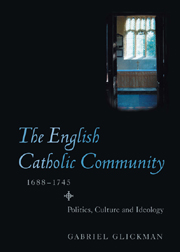Book contents
- Frontmatter
- Contents
- List of illustrations
- Acknowledgements
- Abbreviations
- Introduction
- 1 English Catholics and the Glorious Revolution of 1688
- 2 The making of the Catholic gentry in England and in exile
- 3 Conscience, politics and the exiled court: the creation of the Catholic Jacobite manifesto 1689–1718
- 4 Catholic politics in England 1688–1745
- 5 Unity, heresy and disillusionment: Christendom, Rome and the Catholic Jacobites
- 6 The English Catholic clergy and the creation of a Jacobite Church
- 7 The English Catholic reformers and the Jacobite diaspora
- Conclusion
- Appendices
- Bibliography
- Index
4 - Catholic politics in England 1688–1745
Published online by Cambridge University Press: 12 September 2012
- Frontmatter
- Contents
- List of illustrations
- Acknowledgements
- Abbreviations
- Introduction
- 1 English Catholics and the Glorious Revolution of 1688
- 2 The making of the Catholic gentry in England and in exile
- 3 Conscience, politics and the exiled court: the creation of the Catholic Jacobite manifesto 1689–1718
- 4 Catholic politics in England 1688–1745
- 5 Unity, heresy and disillusionment: Christendom, Rome and the Catholic Jacobites
- 6 The English Catholic clergy and the creation of a Jacobite Church
- 7 The English Catholic reformers and the Jacobite diaspora
- Conclusion
- Appendices
- Bibliography
- Index
Summary
If the ideology of Catholics in exile grew within a relatively free and prosperous political space, recusant discourse in England was framed in an environment far more threatening and claustrophobic. Though the Catholic lay leaders demonstrated notable resilience in the face of social pressure, their prospects for the future still appeared, in contemporary judgements, to be distinctly parlous. Memories of 1688 entrenched a state of estrangement from the body politic: a starkly ironic end to the great loyalist turn in Catholic thought, when older Jesuit theories of resistance had been surmounted by a patriotic commitment to the Stuart throne. Now, in a kingdom vigorously asserting its Protestant identity, Whig pamphlets could assert that ‘Foreign jurisdiction in the Pope, and a Foreign Pretender to our Crown, are inseparable’, in a manner that mocked the very appellation of the loyal recusant. The situation was paradoxical, when private correspondence revealed the continuing regard in which Catholics held the patriotic virtues. The Lancashire landowner Caryll, Lord Molyneux reserved admiration for those who ‘will serve their own country as is duty bound, who will … act like men of honour and integrity …. This is my intention and only design [to be] steadie to my principles and to act like a man of Honour.’ However, in the wake of the Glorious Revolution, it was far harder to articulate national feeling – or, at least, far harder to be heard. With suspicions of treason cast over Catholic leaders, and the penal laws returned, the political odds were stacked more heavily against the recusant community than at any time since the Gunpowder Plot.
- Type
- Chapter
- Information
- The English Catholic Community, 1688–1745Politics, Culture and Ideology, pp. 121 - 157Publisher: Boydell & BrewerPrint publication year: 2009



